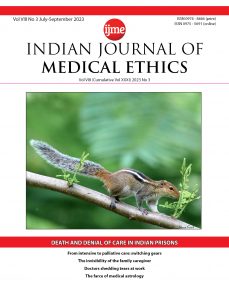
Around 2,000 “natural” deaths are reported in Indian prisons every year. How many of these resulted from denial of medical treatment? An editorial teases apart the opaque language of prison death statistics, to zoom in on the people behind these numbers, and the State’s responsibility for providing appropriate care. A second editorial notes that research on caregiving often misses the critical role played by unpaid and invisible family caregivers. A third questions Indian academia’s use of citation metrics developed for Western conditions.
Can doorstep delivery of health services overcome barriers to care? An analysis of the Tamil Nadu government’s progressive scheme for non-communicable diseases identifies its limitations and suggests interventions to improve access.
Research ethics problems sometimes become evident only in the course of one’s work. One researcher describes the challenges of fieldwork in infertility clinics, and another discusses informed consent during research with institutionalised children.
Two studies examine how ethics is internalised — one assessing what teachers feel about the new competency-based physiology curriculum, and the other looking at medical students’ thoughts on their choice of profession during the Covid-19 pandemic.
Reflecting on their practice, a group of emergency medicine specialists discuss the integration of palliative care in emergency medicine. Other contributions include a doctor on the value of breaking down at work, an ayurvedic physician debunking the notion of “medical astrology”, and more.
__________________________________________________________________________________________________________
Cover credit: Keep moving! by Dr Uma Kulkarni
